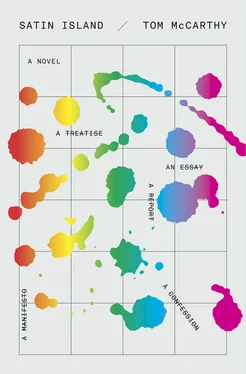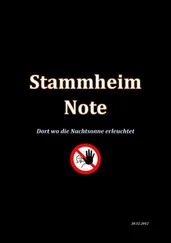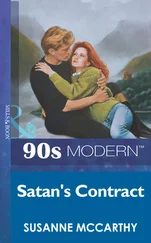12.12I woke up. Madison was still asleep. It was just five o’clock. I pulled my clothes on and went home. Arriving there, I sat at my desk. Below me, on its surface, lay the wreckage of the Great Report’s aborted launch. Outside, the day was, once more, grey. Small specks of water hung about the air. The courtyard, the pond, the concrete stepping-slabs set in it, the glass and concrete of the buildings all around, the general graphite texture of the dawn — these things seemed, in that moment, both consistent, all forming a single object with a single membrane, and, at the same time, porous, like some kind of wrapper that was starting to leak whatever content it was meant to keep wrapped up. Not fully awoken, still enfolded in my dream, I seemed to be consistent with this membrane too, to partake of its leakage. Leaning forwards with my forearm horizontal, perpendicular to the table, I used it to push a coffee cup and sundry other objects to one side. Then I wrote, with a pencil, directly on the blotter paper, on a small patch of it the forearm-pushing had exposed, the two words from my dream: Satin Island . Then I went and had a shower.
12.13I couldn’t shake the dream off all day: it sat right at the centre of my mind, consuming all my thoughts. Later, in the office, I took Patty and Ulrike down and pinned up in their place a bunch of images of barges carrying rubbish out to the Fresh Kills landfill site in New York Harbor. Staten Island: that’s what that part of town was called — the fifth, forgotten borough, the great dump. That this place — both its name and function — had prompted my own dream seemed obvious: my sleeping mind had done little more than change Staten into Satin . I found the images online: pictures of barges, seagulls flocking around them, gorging themselves on their cargo; or of the garbage mountains photographed from above, from high up, even from beyond the stratosphere: like the Great Wall of China, the dump used to be visible from outer space. I say “used to be” because (as I found out) it had closed down in 2001, although it had briefly re-opened soon after to receive the rubble from the World Trade Center. Now, though, the miles of landfill were being transformed into nature parks. Beyond these, as before, stretched more miles of suburbia. All this the Internet told me. Next, I started following the trail of the word satin . Satin, as I knew from my old jeans-brief, is a type of weave, one in which warp yarns, floated over weft ones, form a glossy surface. I printed off an illustration showing the exact weave-structure. Then I looked at statins — a third term that, the more I reflected, was suggesting itself to me as a hidden link joining the actual word I’d heard, or maybe spoken, in my dream, Satin , and the un-enunciated but still obviously connoted Staten . Statins are cholesterol-lowering drugs inhibiting enzyme production in the liver. I found an illustration of their chemical composition, printed it off too, and pinned it next to the one showing satin’s weave. I also printed off a picture showing wooden bleachers by an empty sports-field in the unincorporated town of Satin, Texas (population: 86); and the batting statistics of a former baseball player named Josh Satin, who had spent his career vacillating between major and minor leagues. Neither he nor the town could have been sources for my dream, since I’d not heard of either before; but I printed them off all the same, and plenty more besides. Soon all my walls were covered with such things.
12.14Tapio phoned. Will you be here on Friday? he asked. Yes, I answered. Come see Peyman in the morning, he instructed me. Bring your Koob-Sassen dossiers. My Koob-Sassen … I repeated. The files, your findings, all the stuff you’re working on, he said. I think I’ve circulated most of these already, I told him. This was true: I’d processed the civil-servant transcripts, the Parisian financial-service-worker ones and many other documents of that ilk — analyzed them, run them through the ethnographic mill, interpreted the data this procedure yielded and sent my interpretations up, through the relevant floors and across the requisite desks, to Peyman. Yes, said Tapio — but I mean the other stuff, the extra bits: that’s what he wants to see. Oh, I said. I looked up at my walls. Whereas before, I’d been able to parlay my parachute wallpaperfragments into a coherent and insightful contribution to the Company’s overall work on Koob-Sassen (I’d since seen my in-transit metaphor, my perpetual-state-of-passage analogy, used in both internal and external Company memos on the subject), these images — the piles of rubbish, barges, seagulls — seemed to resist all incorporation into any useful or productive screed. I stared at the empty bleachers, trying to think of something to say. Eventually, Tapio broke the silence. Just bring up what you’ve got, he said. Okay, I answered; then he hung up.
12.15The next — and final — time I visited Petr, I realized that I’d been wrong on the subject of the windows. They were still all smudged and blackened, as they had been last time — nothing had changed there. So was his flesh: the dark lumps were still pushing up from under the skin’s surface, clouding it. My thinking on my first visit had been that, since the people in this ward, all facing imminent obliteration, had been positioned high up in this tall hospital, the conditions were perfect for affording them a really good sight of the world they would soon take their leave of, a bird’s-eye view of one of its greatest and most teeming cities. Whether the placement had been done by design or chance, it was appropriate: if, as you die, you’re meant to see your life, and life in general, with total clarity, then this small, parting 20/20 moment had been facilitated, laid on, set up by the architecture in which the patients found themselves — only to be confounded, snatched away again, by something as banal as a housekeeping oversight; or, if not an oversight, a small act of administrative penny-pinching. On this final visit, though, I came to see that, along the very lines that had made me view it as so wrong earlier, the windows’ dirtiness was in fact totally correct. It was the world, its stuff, that had left its deposit — on the windows and in Petr’s bones, his organs, flesh and arteries. The stuff of the world is black. If Petr’s flesh was turning black it was because he’d let the world get right inside him, let it saturate him, until he was so full of it that it was bursting out again, erupting with a radiating luminescence. Thinking these thoughts while Petr talked to me of this and that (I have no recollection of what he spoke about that day), I began to suspect that he had already, in an almost literal sense, become an angel; looking around the ward, I grew convinced that it was also full of angels: figures whom the world had so deeply penetrated, flooded, impregnated that, refined in them, its forms and colours stripped down to their pure, constituent goo, it emanated back out from them — not as light but as its opposite: this formless, nameless blackness so dense and concentrated, so intense and blinding that, confronted by it, mortals like me had to shield our eyes.
12.16I went straight home after this visit. My desk was as I’d left it, with those two words from my dream written in pencil on the one part of the blotter pad that wasn’t cluttered up. Staring at them, I was struck by a thought: perhaps, I told myself, those words could form my Great Report. Not just its title, but its content too: the whole damn thing. Rather than hand Peyman new Koob-Sassen Project dossiers when I met him that Friday, I could announce that I’d completed this epochal task, and deliver it to him: all bound and laminated and what-have-you, with nothing but these two words in it. Perhaps, I told myself, I could present him with this actual blotter sheet. Framed? Folded? Scrumpled up? If scrumpled up, would it play out as a resignation notice? Probably. If framed, would he accept it, hang it on his office wall, sit looking at it as he talked, elaborated concepts and connected people, use it as a visual touch-point for all these activities? Possibly. Certainly, the fact that it came from me, and the context within which it was presented, would imbue it for him with all kinds of cryptic meaning. And besides, I felt with real conviction that it was full of this already: meaning of a genuinely deep and intense nature, whose sense eluded me but whose presence radiated, pouring into everything around it. Squinting, I tried to look at the blotter sheet as though it were a picture, rather than a page. The S s of both Satin and Island were sliced through by a thin, curving, brown line, since they lay on the circumference of a stain left by the coffee mug I’d cleared away. To the d ’s right, slightly beneath it, like a comet’s tail, was a big splodge of the same colour. Under this, in smaller letters, I wrote Rumpelstiltskin. Secret name , Peyman had said. I sat staring at the pad for a while longer; then, crossing out all of this last word’s letters but the first R , I changed it to Rosebud .
Читать дальше












